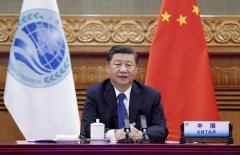Biden's solar ambitions collide with China labor complaints
The Biden administration’s solar power ambitions are colliding with complaints the global industry depends on Chinese raw materials that might be produced by forced labor
May 24, 2021, 4:17 AM
6 min read
FILE - In this Jan. 5, 2021, file photo, an employee works at a solar panel and solar equipment factory in Jiujiang in central China's Jiangxi Province. The Biden administration’s solar power ambitions are colliding with complaints the global industry depends on Chinese raw materials that might be produced by forced labor. (Chinatopix via AP, File)
BEIJING -- The Biden administration’s solar power ambitions are colliding with complaints the global industry depends on Chinese raw materials that might be produced by forced labor.
A big hurdle is polysilicon, used to make photovoltaic cells for solar panels. The global industry gets 45% of its supply from Xinjiang, the northwestern region where the ruling Communist Party is accused of mass incarceration of minorities and other abuses. Other parts of China supply 35%. Only 20% comes from U.S. and other producers.
Biden’s climate envoy, John Kerry, says Washington is deciding whether to keep solar products from Xinjiang out of U.S. markets. That sets up a conflict with President Joe Biden’s plans to cut climate-changing carbon emissions by promoting solar and other renewable energy while also reducing costs.
In Xinjiang, more than 1 million Uyghurs and other members of predominantly Muslim ethnic groups have been forced into detention camps, according to foreign researchers and governments. Authorities are accused of forced sterilizations of minorities and of destroying mosques.
Chinese officials reject accusations of abuse and say the camps are for job training aimed at economic development and deterring radicalism.
U.S. and some Chinese solar vendors have pledged to avoid suppliers that might use forced labor. It isn’t clear, however, whether they can meet rising demand without Xinjiang, where Beijing won’t allow independent inspections of workplaces.
The biggest manufacturers all use raw materials from Xinjiang and have a "high risk of forced labor in their supply chains,” according to a May 14 report by researchers Laura T. Murphy and Nyrola Elimaat of Britain’s Sheffield Hallam University.
The possibility of forced labor “is a problem,” Kerry told U.S. legislators last week. He cited “solar panels that we believe in some cases are being produced by forced labor.”
Western governments have imposed travel and financial restrictions on Chinese officials blamed for abuses. The U.S. government has banned imports of cotton and tomatoes from Xinjiang, citing concerns over forced labor.
The administration was assessing whether to extend that ban to solar panels and raw materials from Xinjiang, Kerry said. He said he didn't know the status of that review.
At issue is the government's “labor transfer” program, which places workers in Xinjiang with companies.
Chinese officials say it is voluntary, but Murphy and Elimaat argue it takes place in “an environment of unprecedented coercion" and is "undergirded by the constant threat of re-education and internment.”
“Many indigenous workers are unable to refuse or walk away from these jobs,” their report says. It says the programs are “tantamount to forcible transfer of populations and enslavement.”
Murphy and Elimaat said they found 11 companies engaged in forced labor transfers of Uyghurs and other minorities and 90 Chinese and foreign enterprises whose supply chains are affected. They said manufacturers need to make “significant changes” if they want to avoid suppliers that use forced labor.
Murphy and Elimaat say the biggest global solar equipment manufacturers — JinkoSolar Inc., LONGi Green Energy Technology Co., Trina Solar Energy Co. and JA Solar Holdings Co. — might have forced labor in their supply chains.
Trina and JinkoSolar also have “possible labor transfers” in factories, while a JinkoSolar facility is in an industrial park that also has a prison, according to Murphy and Elimaat.
JinkoSolar, LONGi, Trina and JA Solar didn't immediately respond to questions about the report.
At the same time, a supply crunch as demand surges has boosted polysilicon prices more than 100% since January to a 9-year high.
The market is “already undersupplied,” Johannes Bernreuter, head of Germany’s Bernreuter Research, said in an email.
China is both the biggest global market for solar equipment and the biggest producer.








